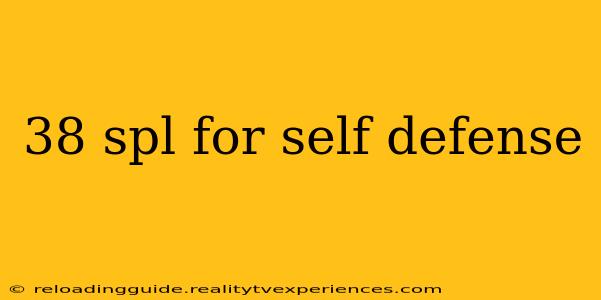The .38 Special is a classic cartridge with a long history, and its suitability for self-defense remains a topic of ongoing discussion. This in-depth guide will explore the .38 Special's strengths and weaknesses in a self-defense context, helping you make an informed decision.
The .38 Special: History and Ballistics
Developed in 1898, the .38 Special (.38 Spl) quickly gained popularity for its reliability and stopping power. Its relatively low recoil makes it manageable for many shooters, including those with less experience. The cartridge fires a .357-inch diameter bullet at a variety of velocities depending on the ammunition. Common bullet weights range from 110 to 158 grains. While not as powerful as some modern cartridges, the .38 Special offers a respectable balance of stopping power and manageable recoil.
Advantages of the .38 Special for Self-Defense
- Wide Availability: Ammunition for the .38 Special is readily available and relatively affordable compared to some more specialized calibers. This is a significant advantage in a self-defense scenario where quick access to ammunition is crucial.
- Recoil Management: The relatively mild recoil makes the .38 Special suitable for smaller-framed individuals and those new to firearms. This allows for quicker follow-up shots, a critical factor in a self-defense situation.
- Proven Track Record: The .38 Special has a long and well-documented history in law enforcement and self-defense, demonstrating its effectiveness over decades.
- Variety of Ammunition: A wide range of ammunition types are available, including jacketed hollow points (JHP), full metal jacket (FMJ), and soft point bullets, allowing for customization based on individual preferences and legal restrictions. JHP rounds, designed to expand upon impact, generally offer superior stopping power compared to FMJ rounds.
Disadvantages of the .38 Special for Self-Defense
- Stopping Power Compared to Modern Cartridges: Compared to more powerful cartridges like the 9mm or .45 ACP, the .38 Special's stopping power is often debated. While effective, it might require more precise shot placement to achieve the same incapacitating effect.
- Penetration: While penetration is important for self-defense, excessive penetration can pose risks to bystanders. The .38 Special's penetration can vary greatly depending on the ammunition chosen.
- Accuracy: While manageable, the .38 Special's relatively mild recoil can affect accuracy, especially for less experienced shooters. Proper training and practice are crucial to maximize accuracy.
Choosing the Right Ammunition
The choice of ammunition significantly impacts the .38 Special's effectiveness in self-defense. Jacketed Hollow Point (JHP) ammunition is generally preferred for its expansion and stopping power. However, it's crucial to understand the legal restrictions and limitations in your area concerning self-defense ammunition.
Training and Practice are Essential
Regardless of the caliber chosen, proper training and regular practice are paramount for effective self-defense. This includes learning proper firearm handling, aiming techniques, and situational awareness.
Legal Considerations
Laws concerning self-defense vary significantly by location. It's crucial to understand the legal implications of using a firearm for self-defense in your area before carrying a weapon. Consult with legal counsel and local law enforcement to ensure compliance with all relevant laws and regulations.
Conclusion
The .38 Special remains a viable option for self-defense, offering a balance of manageable recoil and stopping power. However, it's essential to carefully weigh its advantages and disadvantages, select appropriate ammunition, and undergo comprehensive training. Ultimately, the best choice of firearm and ammunition depends on individual needs, physical capabilities, and local legal considerations. Remember, responsible gun ownership is key. This information is for educational purposes only and should not be considered legal or professional advice. Always consult with qualified professionals for specific guidance.

